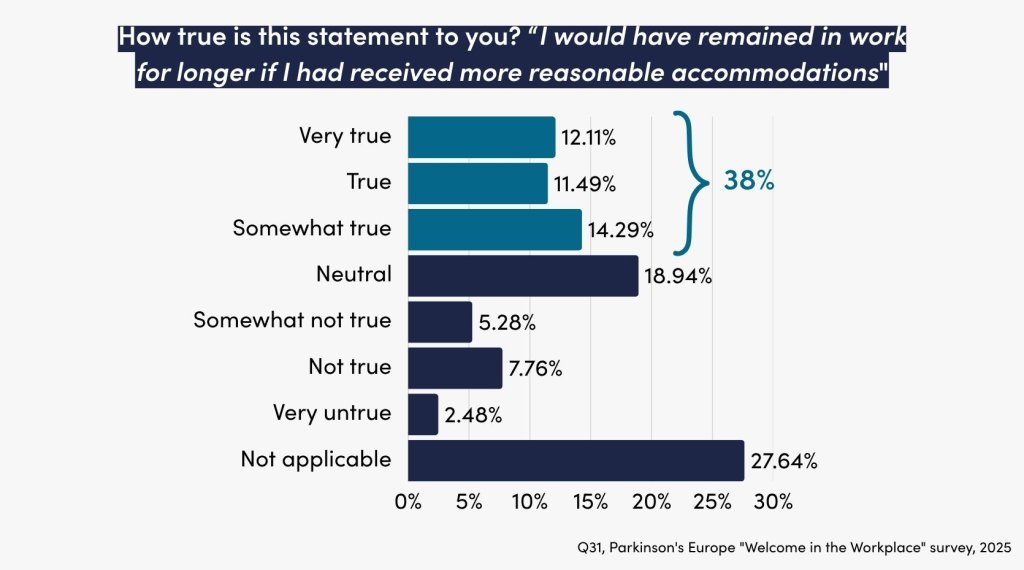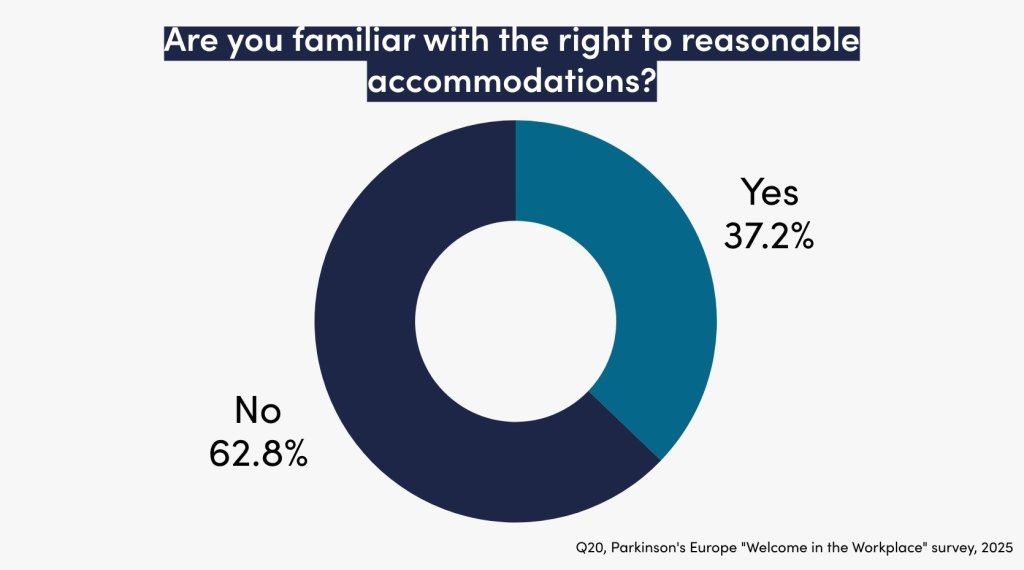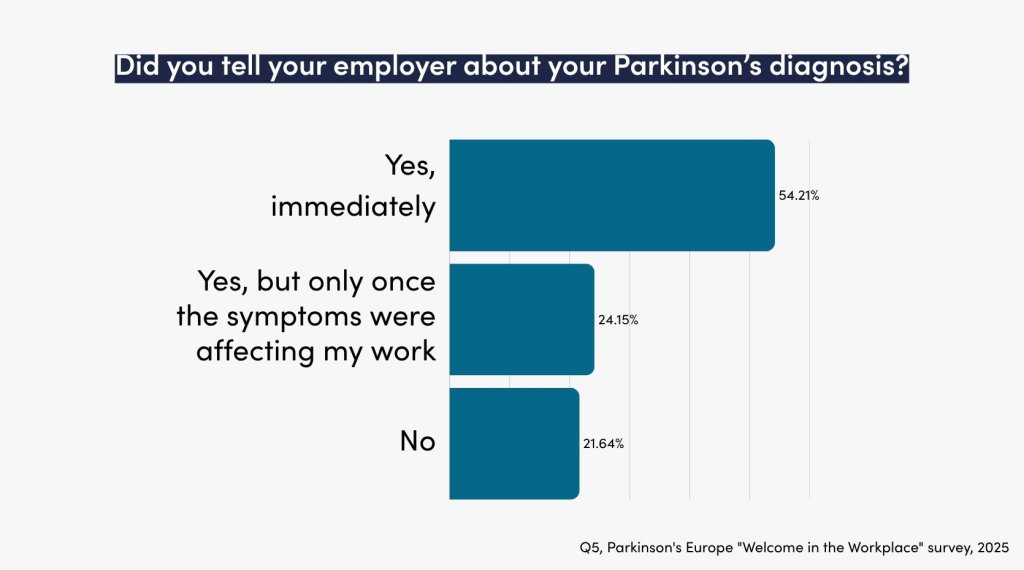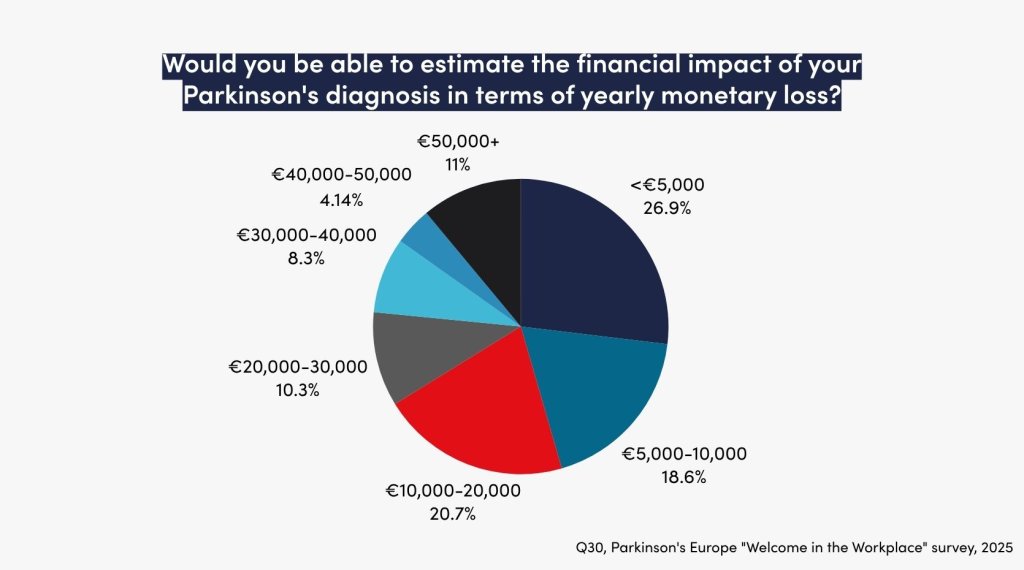
People with Parkinson’s have the potential to work for longer if given adequate support in the workplace, according to a new study by Parkinson’s Europe.
Lack of knowledge around workplace rights, fear of stigma and steep financial losses also were among key findings in the charity’s ‘Welcome in the Workplace’ survey. The study drew responses from nearly a thousand people living with Parkinson’s from across the globe.
Respondents were asked to share their experiences of living with Parkinson’s while working with the condition. Topics included when they disclosed their diagnosis to employers, if and how their roles were adjusted, and the effect of Parkinson’s on their finances.
The majority of the 896 respondents were from Italy, France and the UK, but included contributions from across Europe and beyond including Australia, India and Japan. Almost half (45%) were diagnosed with Parkinson’s in the past 1-5 years.
“It is essential to focus on the experiences of people living with Parkinson’s when working to improve their care and overall quality of life,” says Parkinson’s Europe President Josefa Domingos.
“The results from Parkinson’s Europe’s survey clearly show that this principle applies beyond clinical environments. The survey highlights an often-overlooked aspect of living with Parkinson’s: the importance of sustainable employment and the right of individuals to remain active, valued, and supported in the workplace.”
The survey was conducted as part of a Welcome in the Workplace campaign, aiming to inform and empower those who live and work with Parkinson’s. You can find more information about our campaign, along with articles on workplace rights, stories from people working and living with Parkinson’s, and key conversations around working with Parkinson’s.

Working with Parkinson’s: accommodations allow working for longer
People with Parkinson’s could work for longer, if provided with the right support in the workplace, the survey revealed.
The right to reasonable adjustments and accommodations is a key part of EU legislation set out to prevent workplace discrimination against people with disabilities, such as Parkinson’s. This can include asking for an earlier or later start time, working shorter hours, or access to assistive technology. Some two in five people with Parkinson’s asked said they would have stayed in work longer if there were more reasonable accommodations available to them.
Despite this, respondents’ knowledge and experiences of requesting – and being granted – adjustments, was mixed. The survey discovered that of the people with Parkinson’s asked whether they had requested any workplace accommodations, a shocking 26% had not even realised they could do so.
Worryingly, 9% said they had requested reasonable accommodations and been refused. A further 15% had not asked at all because they feared it would affect how they were viewed by their employer or clients.
More positively, some 42% of those asked said they had been granted accommodations or support to help their employment since being diagnosed.
The most commonly granted adjustments were shown to be flexible working hours (for 20%), followed by time off for health appointments (17%) and adjusted working responsibilities (14%). Remote working and time off for health appointments were named among the most helpful.
“Listening to employees, and working with them to create working conditions that allow them to work effectively and comfortably, can mean the difference between a person with Parkinson’s being able to work, or not,” Josefa adds. “It is crucial that everyone feels empowered to request any reasonable adjustments they need, and feels supported in their workplace.”

Lack of knowledge around rights
Despite the legislation designed to drive down workplace discrimination being in place since 2000, our survey revealed a huge gap between what support is available, and people’s knowledge of its existence.
We discovered nearly two thirds of people with Parkinson’s, when asked if they were familiar with the ‘right to reasonable workplace accommodations’, said ‘no’.
In fact, some 47% of those asked admitted they were ‘not familiar at all’ with the overall employment regulations regarding disability, chronic health conditions, or age discrimination in their country.
When asked how easy it had been to find out about what workplace accommodations they are entitled to, only 6.5% of people with Parkinson’s said the process had been very easy. This compared to 8% who had found the process very difficult, and 24% who were still trying to find out what they were entitled to.
Fear and stigma around revealing diagnosis at work
The survey showed stigma is the biggest fear for PwP telling their employer about their diagnosis.

When people with Parkinson’s who had not disclosed their diagnosis at work were asked why, 42% said their reasons were fear-based.
This included fear of being demoted or ‘sidelined’, being treated unfairly or differently, discriminated against, with 21% expressing a fear they would lose their job or contract.
More than half (54%) of those asked told their employer ‘immediately’ about their diagnosis, while a quarter (24%) disclosed it only when symptoms were beginning to affect their work.
Over one-fifth did not disclose their diagnosis to their employer at all. Of those who had delayed or not yet disclosed their diagnosis in the workplace, key factors for this included stigma around Parkinson’s or health issues and disability in general, and concerns around being treated differently. Sadly, one in ten named fear of losing their job or contract as a key factor in their considerations.

Positive reaction from some employers
Interestingly, this fear of discrimination and stigma sat in contrast to the more positive experience many reported of their employer’s reaction when they shared their diagnosis.
Encouragingly, almost half reported that their employer was very supportive in response to their diagnosis, although a small but significant 7% reported a ‘very negative’ response.
When asked about disclosing their diagnosis to the wider pool of colleagues or clients, over a quarter (28%) felt they received a very supportive response, compared to just 3% who received a ‘very unsupportive’ response.
For those considering when to reveal a diagnosis to their employees, just over half said they disclosed it straightaway, while 27% waited until symptoms began to affect their work. One fifth (21%) said they did not share their diagnosis with employees at all.
Financial impact of working with Parkinson’s
The survey also explored the financial issues associated with working with Parkinson’s, showing the tangible impact the condition – and support in the workplace – can have. Indeed, nearly six out of ten people with Parkinson’s we asked (58%) felt receiving a Parkinson’s diagnosis had impacted their financial security.
The main reasons for this included incurring additional costs due to having the condition, followed by having to go on disability benefits, reduce their working hours or retire early.
For many, the result of additional costs plus lost or reduced income is substantial. When asked to estimate the financial impact of their diagnosis in terms of yearly monetary loss, one third of people with Parkinson’s told us the condition costs them over EUR20,000 per year. This included 11% who estimated their monetary loss to be more than EUR50,000 per year.

Working with Parkinson’s – by people with Parkinson’s
As well as contributing to key data for this survey, many respondents shared their stories of navigating the workplace as a person with Parkinson’s. Their comments include:
“I have been embarrassed that people might find out I have it and think less of me in the workplace. I managed 10 years but now it’s too much and my health is more important.”
“Thanks to reasonable accommodations I am still working, and enjoying my work.”
“My boss has told me on two occasions that she has had a report from a member of staff that I have an angry face. This is actually called hypomimia or masked face. It means that my face may sometimes look blank or angry but this does not reflect my mood as I am a happy person.”
“So far the symptoms do not impact my job, and my employer has been supportive. They indicated they are willing to look into what I need if the symptoms get worse.”
“Despite giving reasonable and varied suggestions for adapting my workplace role, my employer told me my ‘role would not change’. This was the official written message, but in reality I was replaced in my role very quickly when I was not able to handle the intensity of working five days a week plus one evening in a high-stress job.”
“I had problems with drowsiness after taking medications. Most of my bosses respected this and let me ‘power nap’ and make up time. But my immediate boss said ‘my business doesn’t revolve around your drug taking’, and told me there was no such thing as a part-time version of my job.”
“The diagnosis came as a bombshell. Although I was prepared for it and supported in my legitimate request to reduce my working hours, my employer dismissed me. It was very cruel.”
“”The company I currently work for is inclusive. I am very fortunate. Professional social ties are important to avoid being excluded from society. Job retention should be emphasised in all companies.”
“I would honestly like to retire, because with Parkinson’s, I would like a more peaceful life and to devote more time to movement. All the specialists have told me to walk a lot and do physiotherapy and yoga, but after work I am exhausted and I do not always manage it.”
“When your role involves having to face an audience, preparation is more challenging due to memory difficulties and not losing the thread of the conversation. Even interacting with computer or smartphone programmes has become more difficult.”
“I fear that when I can no longer keep up with the pace, which even my ‘healthy’ colleagues struggle to maintain, I will be given a bureaucratic job that will not give me any satisfaction, running the risk of falling into depression.”
